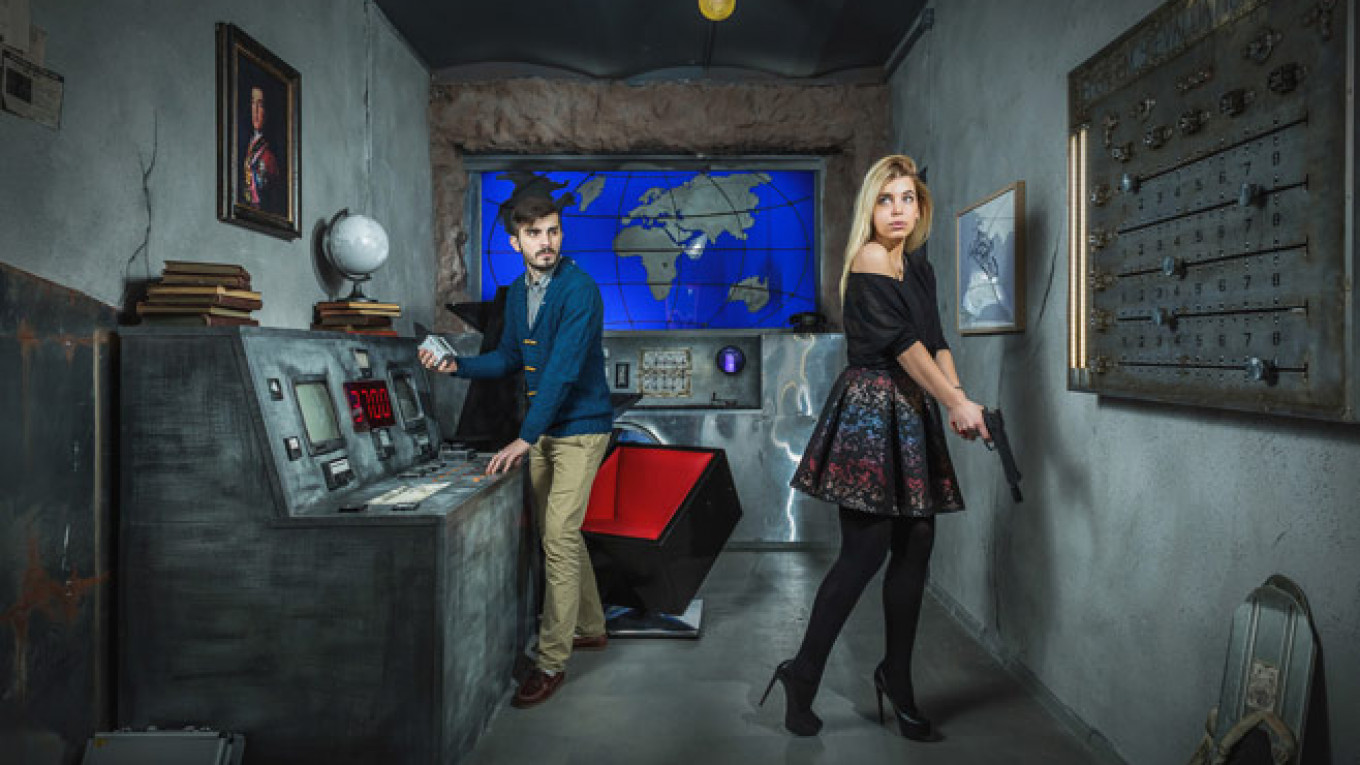Real-life room escape games are booming in popularity in Russia, becoming a new form of entertainment for a Friday night. But why are so many people willing to be locked up for fun?
By Sasha Raspopina for The Calvert Journal
"No, don't stop, it's gonna crush my fingers!" I shriek at a friend as I try to push a button hidden in the wall as a black shutter slowly lowers, inches from my hand. My friend is standing inside a shabby Soviet wardrobe, turning the rail like a screw to lift the shutter, while another of my friends is writing down the Roman numerals that light up when I press the button. We translate them into Latin numbers and use the code to open a combination door lock. Fast forward five minutes and me and my friend are trying to guide a little metal ball through a pinball-style maze as another friend behind us is frantically peddling an old exercise bicycle to reveal the next puzzle. But as the ball falls into the hole and the key falls out, we find out that the door we have been trying to open is fake, and the entrance to the lab is through the secret door in the back the wardrobe. Inside the lab we hastily disarm a bomb and prevent a nuclear disaster. Then we get our coats, pat ourselves on the back and go for frappuccinos.
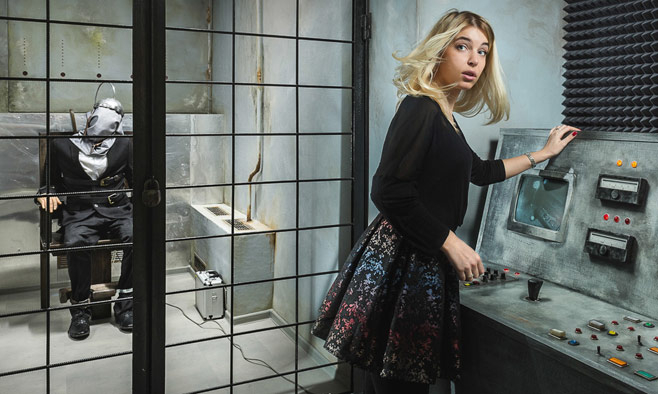
Promo photo for the "Doctor No" quest
It won't be a revelation to say we didn't disarm any live bombs. Instead, we played a real-life room escape game called "The Mystery of Chernobyl," situated in a basement in a dusty residential yard in the center of St. Petersburg. The scenario was staged around the persona of a fictional professor Igor Radchenko, a worker at the Chernobyl plant who mysteriously disappeared just days before the disaster in April 1986. Near the end of the quest, we were in for quite a plot twist, which revealed that Radchenko blew up the Chernobyl plant on purpose, and had planned another explosion for the Leningrad nuclear station — a detailed letter we'd found in the lab explained the rogue professor's motives. What started out as an investigation of Radchenko's disappearance turned into a mission to save Leningrad.
Room escape games like this one have grown incredibly popular in Russia over the last year. They were initially inspired by video games, where you would have to find your way out of the locked room by looking for clues and solving puzzles. In real-life quests you have 60 minutes to escape and must physically utilize the objects around you — a key to a desk drawer might be attached to an inconspicuous stuffed toy, and a code to a lock might be written on the inner side of the desk drawer. You are also given a walkie-talkie and can ask your quest administrator for hints and tips.
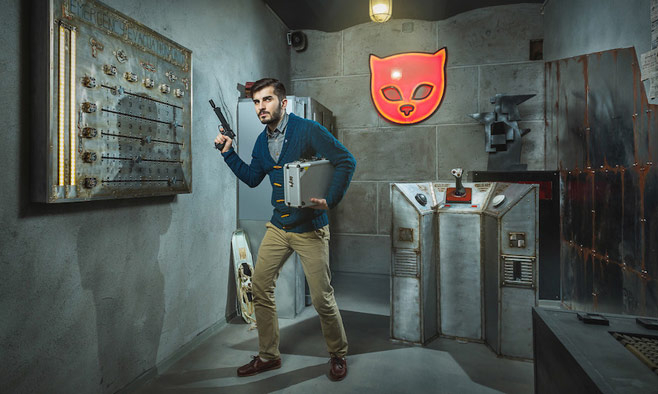
Promo photo for the "Doctor No" quest
The first offline "room" is said to have appeared in Silicon Valley in 2006. It inspired many others, mainly in Asia countries including Hong Kong, Taiwan and Singapore. By 2010 these games had spread all over the word. But they've mostly remained underground except in Russia where the quest industry has become mainstream, becoming a popular choice for teenage birthdays, and with many adults preferring it to clubbing.
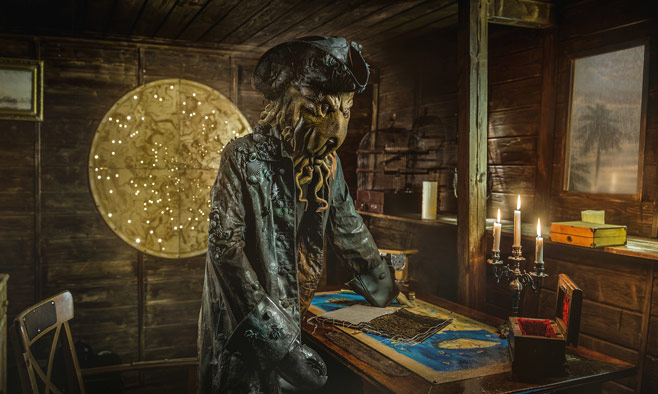
In "The Flying Dutchmen" quest, players help Davy Jones and his crew make it around the Cape of Good Hope and to the safe haven of the shore.
A quick search on Yandex, the popular Russian search engine, returns over 20 St. Petersburg-based companies that entertain people by locking them in various spaces. Together they offer nearly a hundred different scenarios of various difficulty levels, from the typical zombie apocalypse and prison break types, to ones based on films and TV shows ("True Detective," "Boardwalk Empire" and "Twin Peaks"), and highly localized plots that build on the county's history and culture. Or, if you're a quest connoisseur and a simple evil vampire scenario just doesn't excite you anymore, you might be interested in "Buried Alive" where you have to get out of a locked coffin, with the option of a single or a king-sized one if you wish to share your claustrophobia attack with a friend. There's also "Unconscious" where a surreal room represents the mind of a professor who has lost his memory, or the self-explanatory horror of "Cirque Du Satan," creepy clowns galore.
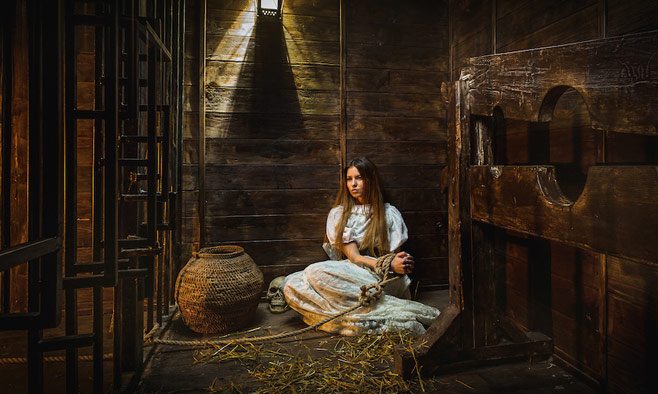
Promo photo for "The Flying Dutchman" quest
From a business point of view, the quest industry is extremely young, and most companies make the rules up as they go. The general structure is similar: A team of writers comes up with scripts and puzzles that are then realized by designers and builders. When these companies hire, they look particularly for young creatives. Some, like the St. Petersburg-based iLocked, have every candidate play the quest as part of their interview, and those who fail are much less likely to get the job. They are even expanding the business to non-Russian speakers — most of the quests offered by bigger companies like Phobia.ru and iLocked offer quests in English.
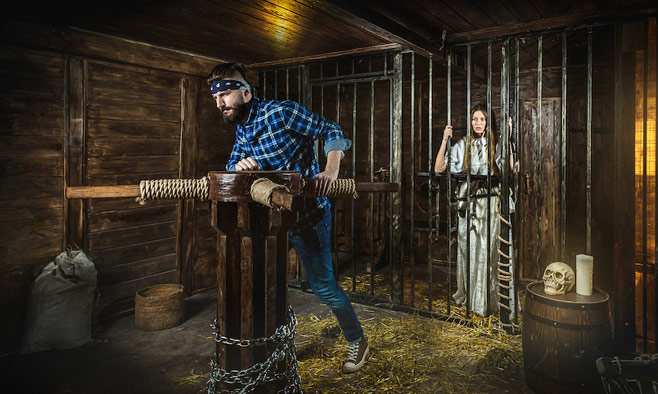
Promo photo for "The Flying Dutchman" quest
Of course, being locked in a confined space might not be everybody's idea of fun, especially when you have to pay a hefty sum — most games in St. Petersburg cost from 1,500 rubles ($26) for morning slots during the week and up to 5,000 ($87) in the evenings and on weekends. Sure, it ends up being more affordable when you divide the cost between the players (most quests require teams of two to six people) but still, for this amount of money, you could go to a bar, enjoy a nice dinner with a bottle of wine, go to the cinema or spend your money elsewhere. Why do people want to spend so much money on an activity that's so nerve-racking?
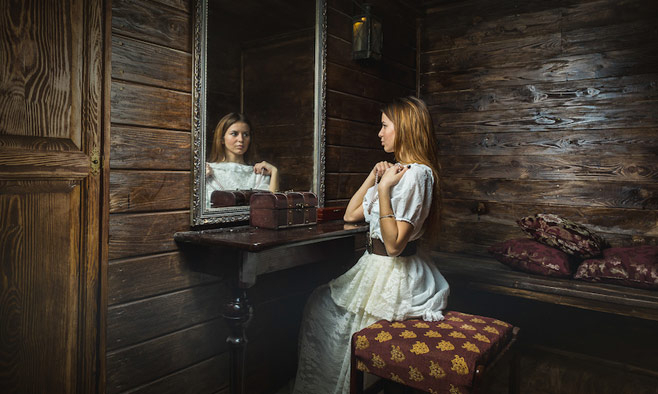
Promo photo for "The Flying Dutchman" quest
Apparently, because they are stressed. Many people say that room escape games have a similar effect to drinking a glass of wine. A feature in the South China Morning Post analyzed the popularity of real-life quests in Hong Kong and concluded that they're especially popular with the city's stressed-out students. Looked at this way, room escape turns out to be more of a reality escape; before entering, you leave your belongings and your life in a locker outside. For an hour you are free of your worries as you live a fictional life in a game that requires all of your concentration. You simply don't have enough time to worry about your to-do list when you're saving the world from a deadly zombie virus outbreak.
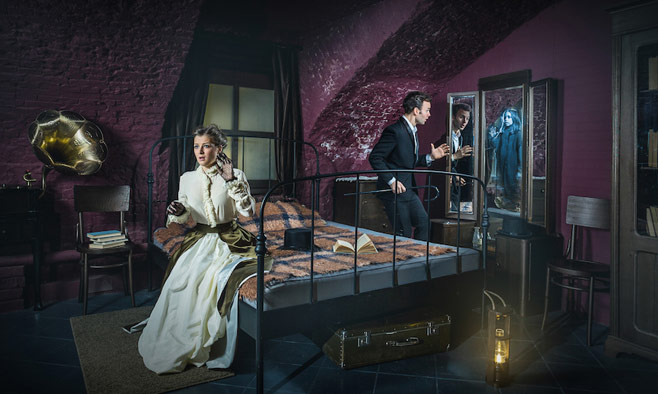
Another quest called "The Haunted House" can be played in Moscow.
Yet Denis Shchukin, a lecturer at St. Petersburg State University and Ph.D. in social philosophy and ethics, offers a different opinion: he says that it's the feeling of stability and safety in our lives that drive us to locked rooms in basements. Shchukin argues that stability — a concept that became ubiquitous in 21st-century Russia after the "wild '90s" — fails to satisfy us, adding that "you can only enjoy peace and quiet sitting in your rocking chair by the fireplace when there's a snowstorm outside of your window." It is the same desire that draws us to horror films and books, and, as Shchukin notes, this is not completely separate from the need to escape reality, which is what stressed out students of Hong Kong look for in the reality quests.
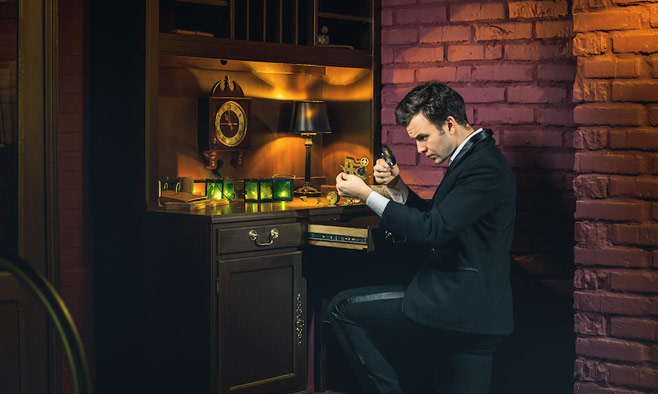
Promo photo for "The Haunted House" quest
With cinema and literature, however, you're stuck in the role of the observer, a part of the audience. Even in video games, where you're more involved, your cannot totally escape reality, whereas in a real-life room escape you get to use your entire body. So does that mean that Russians just want more from their entertainment? "Those tiny doses of other's lives, the micro-injections, are not enough for us. Our soul requires a full immersion into the fictional world!" says Shchukin.
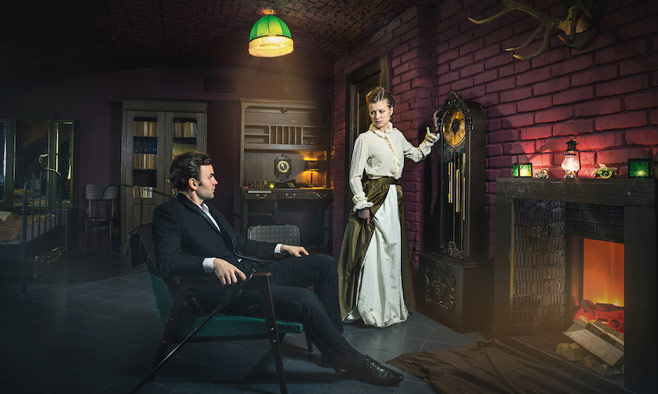
Promo photo for "The Haunted House" quest
The companies that provide this entertainment are less philosophical about what draws people to them. Yevgeny Oshchepkov, one of the founders of iLocked, believes that their popularity is a coincidence, a result of the usual supply and demand at a time when people have disposable income as well as enough free time on their hands. Polina Knyazeva, a representative of Phobia.Ru, attributes the extraordinary levels of demand to the fact that you don't just solve puzzles, you also get wowed by special effects and designs.
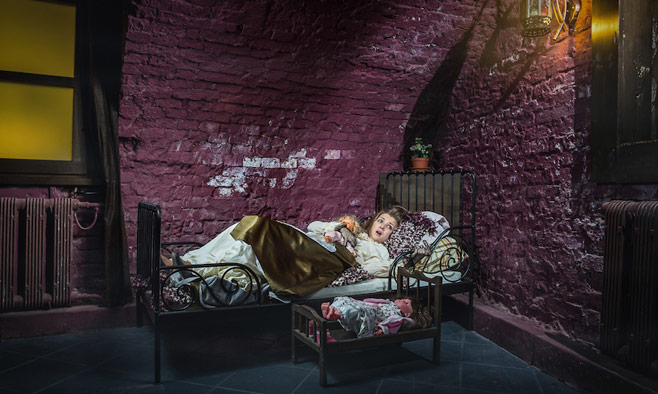
Promo photo for "The Haunted House" quest
Whatever is causing the room escape craze in Russia, it's doing an impressive job — many of the new quests are booked weeks in advance. But whether quests will become as essential a part of the entertainment industry as movies or clubbing is a mystery that's still waiting to be solved.
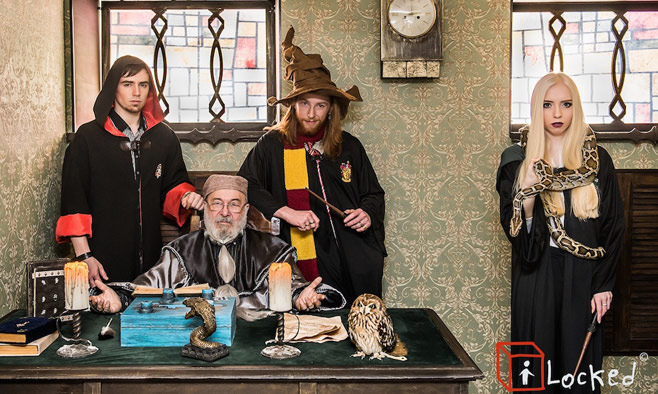
St. Petersburg-based iLocked
This article first appeared in The Calvert Journal, a guide to the new east.
A Message from The Moscow Times:
Dear readers,
We are facing unprecedented challenges. Russia's Prosecutor General's Office has designated The Moscow Times as an "undesirable" organization, criminalizing our work and putting our staff at risk of prosecution. This follows our earlier unjust labeling as a "foreign agent."
These actions are direct attempts to silence independent journalism in Russia. The authorities claim our work "discredits the decisions of the Russian leadership." We see things differently: we strive to provide accurate, unbiased reporting on Russia.
We, the journalists of The Moscow Times, refuse to be silenced. But to continue our work, we need your help.
Your support, no matter how small, makes a world of difference. If you can, please support us monthly starting from just $2. It's quick to set up, and every contribution makes a significant impact.
By supporting The Moscow Times, you're defending open, independent journalism in the face of repression. Thank you for standing with us.
Remind me later.


